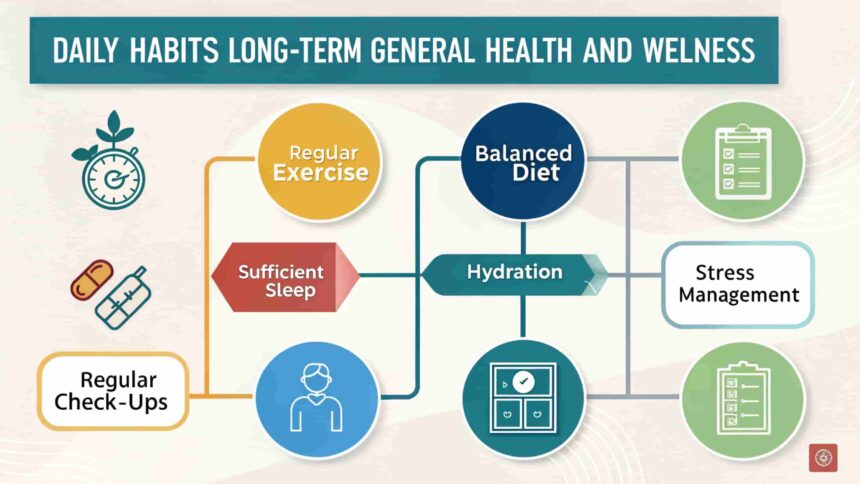Introduction
Maintaining long-term health and wellness doesn’t depend on dramatic actions or expensive solutions. Instead, it revolves around simple, consistent daily habits that strengthen your body, sharpen your mind, and improve your emotional well-being. These habits can reduce the risk of chronic diseases, improve your mood, and help you enjoy a longer, more active life. Let’s explore the most impactful daily practices that contribute to lasting general health and wellness.
Eating a Balanced, Nutritious Diet
One of the foundational habits for wellness is eating healthily every day. A well-balanced diet supports energy levels, immune function, and body weight.
Important tips include:
- Include vegetables, fruits, whole grains, and lean proteins
- Limit added sugars, processed foods, and trans fats
- Drink plenty of water (at least 8 glasses daily)
- Practice portion control and mindful eating
A nutrient-rich diet prevents conditions like obesity, diabetes, and heart disease and supports your brain, skin, and digestion.
Getting Sufficient and Quality Sleep
Rest is essential for healing, cognitive function, and emotional balance. Aim for:
- 7 to 9 hours of sleep per night
- A consistent sleep schedule (even on weekends)
- A relaxing bedtime routine with no screens 30 minutes before bed
- A dark, cool, quiet sleeping environment
Sleep helps your body repair tissues, manage stress hormones, and regulate metabolism, all crucial for long-term wellness.
Staying Physically Active
Daily movement keeps your body strong and your mind sharp. Regular exercise can:
- Reduce the risk of heart disease, stroke, and some cancers
- Improve mood and decrease anxiety
- Boost energy and sleep quality
- Help maintain a healthy weight
Even moderate activity like brisk walking for 30 minutes a day, five days a week, can make a big difference.
Practicing Good Hygiene
Daily hygiene routines protect you from illness and promote confidence. Important habits include:
- Brushing and flossing teeth twice a day
- Washing hands before meals and after restroom use
- Showering regularly
- Keeping nails clean and trimmed
These small actions prevent infections and promote both personal and public health.
Managing Stress Effectively
Chronic stress damages both the mind and body. It raises blood pressure, disrupts sleep, and weakens the immune system. Effective daily habits to manage stress include:
- Practicing deep breathing or meditation
- Taking short breaks during work
- Journaling or practicing gratitude
- Spending time in nature
Even 10–15 minutes of relaxation can recharge your mental batteries and bring clarity.
Staying Hydrated Throughout the Day
Water is vital for energy, digestion, and circulation. Make hydration a habit by:
- Drinking a glass of water first thing in the morning
- Carrying a reusable water bottle
- Choosing water over sugary drinks
- Eating water-rich foods like cucumbers and oranges
Proper hydration supports skin health, kidney function, and joint lubrication.
Limiting Harmful Substances
Long-term health is greatly impacted by what we avoid. Daily habits should include:
- Avoiding tobacco in all forms
- Limiting or eliminating alcohol consumption
- Being cautious with over-the-counter or prescription medications
- Staying away from recreational drugs
These choices reduce the risk of lung disease, liver damage, and various cancers.
Maintaining Social Connections
Positive social interaction supports emotional health. Habits to strengthen connections:
- Calling or texting a loved one each day
- Spending quality time with family
- Joining a club or group activity
- Volunteering or helping others
Good relationships reduce stress, improve mood, and even extend life expectancy.
Continuing to Learn and Grow
Mental stimulation is key to cognitive health. Build habits such as:
- Reading books, newspapers, or educational blogs
- Playing puzzles or memory games
- Learning a new hobby or language
- Staying curious about the world
An active mind is a healthy mind, especially as you age.
Conclusion
Long-term health and wellness come from consistent, healthy daily choices. Eating well, staying active, sleeping enough, and managing stress form the core of a balanced lifestyle. Add hydration, hygiene, social connections, and a curious mind — and you have a powerful daily routine that keeps you strong, happy, and thriving for years to come.









